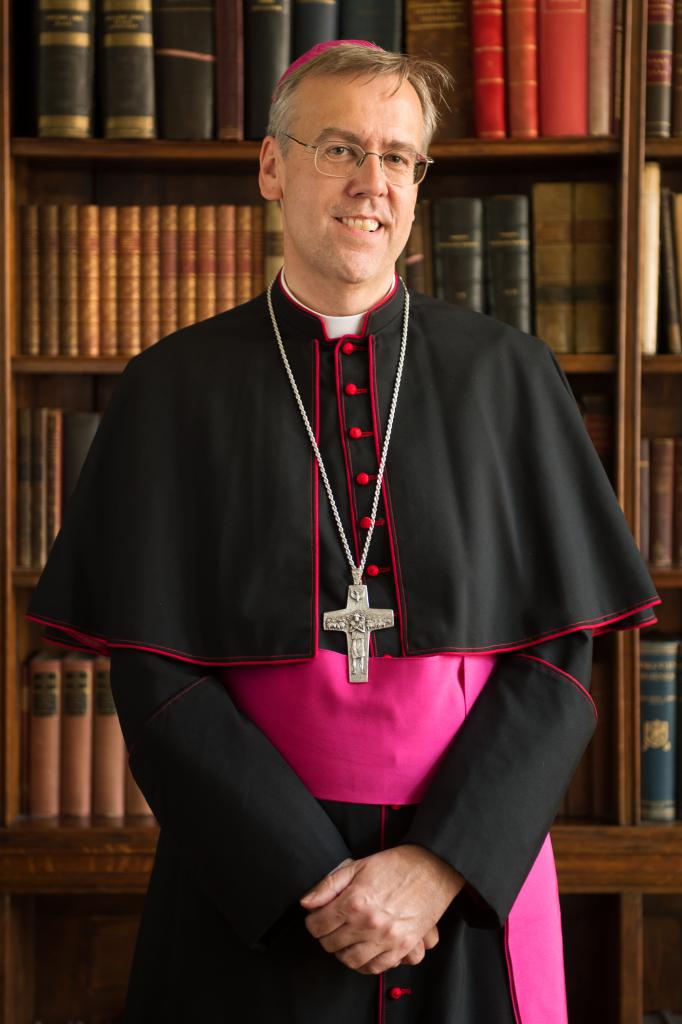In his ordination address, Bishop Nicholas said he was looking forward to getting to know us. So, to help us get to know him, he recently asked him to share his own story.
One of a family of five boys, he speaks of how both sides of the River shaped him: ‘if it was Southwark which gave me faith, it was Westminster which gave me life.’
The strong connection with Westminster was also evident in his baptism in Wimbledon parish since it was a Marist priest from the French church in Leicester Square who celebrated the Sacrament.
‘In so many ways I think of myself as belonging to Westminster and this new chapter as a homecoming of sorts.’
Speaking of his childhood, he says, ‘Just being a large family and having to learn to yield to one another was so important because you are only one of five. It always gave me a very strong sense of family and I’ve always felt that family is one of the most important units in society and in the Church.’
‘Some people find it almost difficult to believe, but I began to feel a call to the priesthood from 5 or 6, and it stayed with me. Whenever I shared it with the family, whilst they took it seriously, they also took a very balanced approach, saying that you have a long time to think about what God is wanting to do with your life.’
The Diocese of Southwark encouraged him to go to university to gain experience. He explains, ‘First, however, I had the opportunity to go to seminary during a gap year, to embark on a course of formation and to understand more deeply what my vocation might be.’
In Cambridge studying history, he encountered a different world. ‘Part of the formation is to observe different values that people hold whilst also getting to know those people for the good people that they are. It was a good way to refine my own value system.’
After Cambridge, he was sent to the Venerable English College (VEC) in Rome in 1981 to continue his formation with degrees in philosophy and theology.
After ordination, Fr Nicholas was appointed to serve in Canterbury, ‘an important city in the history of the Church, ecumenically and for understanding the history of Christianity in Great Britain.’
Whilst there he became involved in catechesis, working with the Christian Education Centre which continued when, in 1991, he was asked to train further in evangelisation and catechesis at Louvain to prepare to become Director of the Centre in 1992.
In 2000, he was asked to become Vice-Rector of the VEC. Bishop Nicholas is keen to stress that changes of work were all made after a period of discernment. ‘I always found that, if discernment is well made with the guidance of the Holy Spirit, then one finds real happiness, even if one is slightly surprised at first.’
He was later asked to become Rector, continuing until 2013: ‘The more I’ve worked with seminarians, the more I admire them for offering themselves to the priesthood because it is so counter-cultural these days.’
Prior to taking up his next appointment as Parish Priest at Wimbledon, he spent a sabbatical term with L’Arche, whom he has known since his time in Canterbury. ‘It has taught me that those with disabilities have a prophetic value. They remind us that you find the Kingdom when you invite into your life people who have no possibility of repaying the hospitality that you offer.’
Many friends from L’Arche were present at his episcopal ordination, along with family and other friends. Reflecting on preparations for his ordination on 4 June, ‘One of the joys was being in contact with so many people who’ve been part of my journey, right back to first teachers, and to bring them all together.’
Bishop Nicholas combines pastoral responsibility for Central and East London with oversight of the Agency for Evangelisation. Asked what his vision is, he replies: ‘If you think of catechesis, prayer, marriage and family life, and the poor, and ask parishes and individuals to reflect on how all of those might be seen to connect in terms of the call to be evangelisers, I think all sorts of different answers will occur. Some parishes might be given the grace to pray for the evangelising work of the diocese. Others may be able to develop and support marriage and family life. There is already deeply impressive outreach to the poor, taking place at the parish level, but which might be owned by families.’
Asked what we can expect from him as a bishop, he says, ‘I’m deeply touched by what Pope Francis says about the role of the bishop in Evangelii Gaudium and I will try hold on to what he asks of a bishop: to be an unassuming and merciful presence in the midst of the people. I’m very clear that I need first and foremost to get to know as many of the parishes and schools and religious as I possibly can in the area before I know what I can be for them.’
This article originally appeared in the Westminster Record in July 2014. To access the full copy of the newspaper, click HERE




